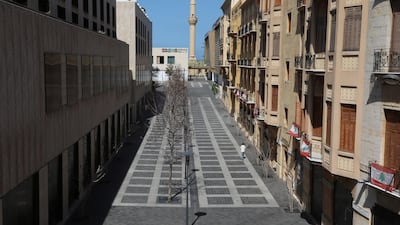Once bustling with life, Beirut’s famed Gemmayze Street is now deserted.
Lined with damaged homes, collapsed buildings and closed businesses, the residential and commercial hub was one of the city’s most vibrant destinations – but not any more.
“It’s like a nightmare. We’ve never seen anything like this before,” said Charbel Bassil, owner of renowned Le Chef restaurant, on the first day of reopening after a nationwide lockdown.
One of Beirut’s oldest and most popular restaurants, Le Chef, in in Gemmayze, is one of many businesses struggling to stay afloat under the weight of Lebanon’s compounding crises.
The family business reopened its doors on March 22, as per the government’s lockdown strategy, but customers were hardly pouring in.
The modest space, which was often full to the brim for lunchtime, now welcomed only three tables after a full day of work, or about 10 customers.
The burst of vigor and energy that characterised the dining experience at Le Chef was replaced by a sense of moping and melancholy.
"We're doing our best to keep going, but everything is a mess," Mr Bassil told The National.
Le Chef , founded in 1967, weathered civil wars and crises, but none harmed trade like Lebanon’s current events.
“This is our family business. I’ve been working here since I was a child, but nothing we lived through was as bad as this,” Mr Bassil said.
After almost losing the restaurant in the Beirut blast, Le Chef was able to rebuild thanks to donations, $5,000 of which came from the actor Russell Crowe. But what the port explosion could not destroy, the economic crisis shattered.
"We can't work in this crisis. Suppliers won't give us goods because of the market rate and we don't know how to price our dishes," Mr Bassil told The National.
“We’re a restaurant for the people. We want to serve high-quality food for affordable prices.”
Lebanon’s currency lost more than 80 per cent of its value since the beginning of the economic crisis, declared one of the worst in the country’s history.
In one year, the Lebanese pound, which once traded at 1,500 to the US dollar, slumped to 15,000 on the parallel market. The minimum wage shrank from $450 to an average of $50, leaving people with insufficient salaries to cover rising living costs.
Political deadlock and the ruling class’s inability to form a government is stalling the introduction of essential reforms needed to unlock international aid.
Consequently, the rocketing currency exchange has hit sectors of all sorts.
“All our struggles are related to the dollar rate. We have to pay for most of our products depending on the black market’s prices,” said Huwaida Rajab, co-owner of Orenda, a vegan cafe in the Mar Mikhael district.
Also significantly hit by the Beirut blast, Orenda picked up the pieces and moved forward with business despite the challenges. It was forced to close again several times by lockdown measures and reopened for dine-in services on Tuesday, March 23.
"We don't know how this will go – we're waiting for customers," Ms Rajab told The National. "We're still pushing through and we have hope, which is why we keep fighting for this business."
But hope is not enough to sustain trade, which is why Ms Rajab and her founding partner muse the question: to close down or hang in there a little longer?
“We discuss this every day and every day we decide to keep going,” Ms Rajab said. “We’re waiting to see how long we can do this for.”
Despite the opportunity to be back in business, Lebanon’s hospitality sector is wary about reopening because operational costs now outweigh profits.
Fewer than 1,000 restaurants and cafes are expected to reopen this week, said Aref Saade, treasurer at the Syndicate of Owners of Restaurants, Cafes, Night-Clubs and Pastries.
Prior to the crisis, Lebanon had about 8,500 tourist institutions in business. The number decreased to 4,500 when Covid-19 struck, and is anticipated to sink below 1,000 due to the soaring and unstable currency exchange rate.
"Businesses are refraining from reopening – it's just not worth it," Mr Saade told The National.
Between the cost of supplies, maintenance, rent, salaries, Covid tests and more, it is now more expensive for Lebanon’s once-booming tourism sector to reopen than it is to shut down.
By the end of 2019, more than 465 restaurants and cafes had closed due to the economic crisis and decrease in the public’s purchasing power, the syndicate said.
Financial losses to the sector were estimated to be about $1 billion, said its president, Tony Ramy.
To support the hospitality sector, Lebanon’s caretaker government eased lockdown measures for Christmas and New Year. The decision backfired, with an overwhelming Covid-19 surge that brought health services to their knees.
A subsequent nationwide lockdown took effect on January 7. Restaurants and cafes have been closed since then.
Despite this much-needed window for hospitality, health experts are concerned about reopening the country.
The head of Lebanon’s parliamentary health committee, Dr Assem Araji, said Lebanon recorded 992 admissions to the intensive care unit on Monday, March 22, the highest figure since the start of the pandemic.
“This number is prone to increasing after the chaotic reopening of the country and lack of adherence to safety measures,” he said on Twitter. “Be careful, prevention is better than cure.”


